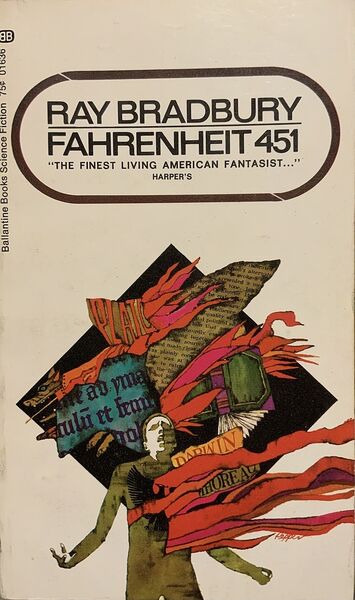Amusing Ourselves To Death
Fahrenheit 451
By Ray Bradbury

18 May, 2025
Ray Bradbury’s Fahrenheit 451 is a science fiction novel.
Fireman Guy Montag and his wife Millie live comfortable, middle-class lives. Millie finds purpose in an endless stream of television entertainment. Guy burns books.
Only weirdos fail to find mass media sufficient. Only freaks find value in books. Surely, no normal person in post-literate America would seek out books. Therefore, books will surely fade away, as forgotten as bustles and buggy whips. But just in case, the firemen burn every bookhoard they find. Libraries being long gone, that means personal libraries.
Guy’s life begins to fall apart the night he encounters and befriends neighbor Clarisse McClellan. The eccentric seventeen-year-old cheerfully embraces unconventionality. The friendship does not last long—Clarisse vanishes, rumored to have been killed by a speeding car—but long enough to open Guy’s eyes to how unhappy he is.
By the nature of their job, firemen are routinely exposed to the temptation of books. Not so very unlikely that someone like Guy might steal a book while burning a trove. A fireman could even assemble their own private trove. What a fireman wouldn’t be able to do, at least in Guy’s case, is to escape the notice of his experienced superior officer, Beatty.
Guy lacks the cultural context to make sense of his stolen books. Millie is no help. Any hint of unconventionality only alarms her. Therefore, the only logical course of action is for Guy to seek out some surviving intellectual and bully him into helping Guy.
There are only a few flaws in Guy’s plan. First, that Beatty knows how to recognize a corrupted fireman. Second, that Millie might betray Guy. Third, and most important, that America is marching proudly to an atomic war from which survival may be impossible1.
~oOo~
The term ‘Manic Magic Pixie Girl’ may not have been coined until 2007, but Clarisse is one such. The archetype long predates the term.
Readers will want to be judicious about the edition of this book that they read, as publisher Ballantine opted to alter certain elements of the novel to avoid offending parents. While this decision may have been thematically appropriate for this novel, it also wasn’t something Bradbury approved once he found out. The affected editions are from Ballantine, 1967 to 1980.
Being an idiot teen, I missed all of the hints—well, outright statements and mass mobilizations—that war was coming. In fact, the novel drives home over and over that another war is Imminent. However, US has won two atomic wars since 1960 and everyone is certain this war will be over in a couple of days. Which in a sense it is.
One might expect that universal censorship is the product of a centralized state. Instead, it’s a self-perpetuating system whose roots are love of convention and comfort2, and a deep-seated hostility to the slightest distress. Books give way to cartoons give way to radio and TV.
Readers might be surprised by who in particular Bradbury singles out to blame in the inevitable tirade about how things got the way they are. Blame those darn minorities!
"Now let's take up the minorities in our civilization, shall we? Bigger the population, the more minorities. Don't step on the toes of the dog-lovers, the cat-lovers, doctors, lawyers, merchants, chiefs, Mormons, Baptists, Unitarians, second-generation Chinese, Swedes, Italians, Germans, Texans, Brooklynites, Irishmen, people from Oregon or Mexico. (…) The bigger your market, Montag, the less you handle controversy, remember that! All the minor minor minorities with their navels to be kept clean.”
So, no Big Brother needed. All that was necessary was the right combination of technology, mass media, and special interest groups. No doubt the book conflagrations are entertaining and they do serve to enforce conformity. At the same time, one could argue that burning books that nobody will ever think to read3 only serves to remind people that the books exist.
I didn’t care for the characters but I can’t hold that against them. Blame their environment. It’s not as if readers will have to spend long with them, as the novel is very short. In our modern context it would be considered a novella. While there are elements that are unintentionally amusing—the impression Bradbury gives that he would have vastly preferred society to have been frozen in aspic in 1910—there are other aspects that have aged well. The novel does reward reading.
Just be careful about which edition you read.
Fahrenheit 451 is available here (Simon & Schuster), here (Barnes & Noble), here (Bookshop US), here (Bookshop UK), here (Chapters-Indigo), and here (Words Worth Books).
Inexplicably, there has never been an edition of this book titled Celsius 233. At least no such edition of which I’m aware.
1: Thus, sorting out the whole USA delenda est angle…
2: Zippers: a modern convenience or a symptom of societal illness? Guy comes down for the second.
The zipper displaces the button and a man lacks just that much time to think while dressing at. dawn, a philosophical hour, and thus a melancholy hour.
I welcome a discussion of the merits of zippers.
3: I am put in mind of George Orwell’s review of Walden Two, which I would quote if I could find it. Unless it was a review of a different book, which would explain why I cannot find it.
